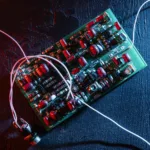
Introduction
Humidity is the amount of water vapour present in the air. Whether high or low, humidity can wreak havoc in your home, creating a breeding ground for mould, mildew, and dust mites. But fear not! In regions with high humidity levels, dehumidifiers are essential devices that help maintain a comfortable and healthy indoor environment. This guide equips you with all the knowledge you need to banish humidity and create a healthy, comfortable home environment.
Introduction to Dehumidifiers
A dehumidifier is an essential home appliance designed to remove excess moisture from the air. It improves indoor air quality by preventing problems associated with high humidity levels, such as mould growth, dust mites, and structural damage to buildings. Dehumidifiers maintain a comfortable and healthy living environment and are ideal for homes, offices, industrial settings, and any area prone to dampness and high humidity levels.
The Importance of Installing Dehumidifiers
Dehumidifiers are indispensable in creating a balanced, comfortable indoor climate. High humidity levels can lead to numerous problems, including health issues like allergies and respiratory conditions. Excess moisture can result in a musty odour and damage the home’s structure, furniture, and electronics, leading to costly repairs. Additionally, by controlling humidity, dehumidifiers help preserve the integrity of homes and improve overall quality of life.
How Do Dehumidifiers Work? Understanding Their Operational Principle
Dehumidifiers work by harnessing their various built-in components, including a fan, coils, reservoir, and reheater. A typical dehumidifier works by pulling in humid air, condensing the water vapour through a series of coils, and collecting the condensate in a bucket or draining it continuously. The drier air is then circulated back into the room.
The Most Common Types of a Dehumidifier
Humidifiers are available in various types, and the best type for you will depend on your individual needs and preferences. Some of the standard options include:
Refrigerant (Compressor) Dehumidifiers
Compressor humidifiers are the most common types of dehumidifiers that use a refrigeration cycle to remove moisture. They are effective in warmer, more humid environments and are commonly used in homes.
Desiccant Dehumidifiers
Desiccant dehumidifiers remove humidity by using a moisture-absorbing material. They work well in lower temperatures and are ideal for cooler climates or specific areas like basements.
Portable Dehumidifiers
Portable dehumidifiers are small yet versatile, stand-alone units that can be moved from room to room as needed. They are ideal for targeting specific areas and are easy to set up and use.
Whole-house Dehumidifiers
As the name suggests, these appliances are designed to dehumidify an entire home and can be integrated into the home’s HVAC system. They offer a comprehensive solution but require professional installation.
Thermoelectric Dehumidifiers
These are the smallest humidifiers, using the Peltier effect to cool air and condense moisture. They are quieter and are suitable for small spaces and low-humidity areas.
Smart Dehumidifiers
Smart dehumidifiers can be controlled remotely via smartphone apps, allowing adjustable settings. They are compatible with home automation systems like Alexa or Google Home, providing seamless integration and enhanced convenience.
Dehumidifiers for Different Spaces – Maximising Air Quality and Comfort
These devices are designed to be used in different spaces in your facilities, such as:
- Bedroom Humidifiers – A bedroom humidifier is a quieter, smaller unit installed in bedrooms to ensure a comfortable sleeping environment without excessive noise.
- Basement Humidifiers – Basements are prone to high humidity and mould growth. To maintain optimal conditions, use a high-capacity basement dehumidifier.
- Office Dehumidifiers – Offices tend to have a lot of people and equipment, both of which can contribute to moisture problems. An office dehumidifier is ideal for controlling humidity levels in small to medium-sized offices.
- Commercial Humidifiers – Commercial models are designed for large office buildings, warehouses, and other commercial spaces. They can handle much larger areas than office dehumidifiers and may be permanently installed or portable.
- Industrial Dehumidifiers – Industrial dehumidifiers help improve comfort and respiratory health and protect wood furniture and equipment from drying out in industrial settings.
- Bathroom Humidifiers – Bathrooms are high-moisture areas that benefit from a portable dehumidifier to prevent mould and mildew.
- Whole-house Solutions – These are humidifiers for home or those with central HVAC systems, providing comprehensive humidity control throughout the entire house.
Installation, Maintenance, and Selection Parameters of a Dehumidifier
When installing a dehumidifier, remember to place it in an area with good air circulation. Also, place humidifiers away from walls or furniture that could block airflow. For optimal results, keep doors and windows closed while the unit is operating. Cleaning air filters and emptying the reservoir regularly can provide optimal performance. When shopping for a dehumidifier, look for the following features:
- Humidifier Type
- Capacity
- Reservoir Size
- Ease of Installation
- Durability and Reliability
- Energy Efficiency
- Continuous Drainage Option
- Digital Controls
- Noise Level
- Portability
- Budget and Brand.
Popular Brands and Models of Dehumidifiers
Dehumidifiers are easily accessible and have a range of models equipped with advanced features. Multiple online marketplaces and brands, including a Meaco humidifier, offer their user-friendly designs known for affordability, reliability, and efficiency. Users from different regions can easily find an extensive range of quality appliances by simply adding the desired model and brand to search engines. For instance, a dehumidifier UK or a dehumidifier Argos, etc., will open up multiple sites from which to search. Some reputable dehumidifier brands include:
- Meaco Dehumidifiers
- Frigidaire
- Honeywell
- Keystone
- Daewoo Humidifiers
- Home Labs
- Ivation
Exploring Real-World Applications of Dehumidifiers
Dehumidifiers maintain optimal humidity levels in various environments with diverse real-world applications across residential, commercial, and industrial settings, such as:
- Basements
- Bathrooms
- Bedrooms and Living Areas
- Retail Stores and Warehouses
- Office Buildings
- Museums and Archives
- Manufacturing Plants
- Food Processing Facilities
- Water Treatment Plants
- Storage Facilities
- Agriculture Applications.
Final Thoughts
Dehumidifiers are a valuable tool for maintaining a healthy indoor and work environment. Whether you’re dealing with allergy issues, trying to protect your home from damage, or simply seeking a more comfortable living space, the right dehumidifier can make a significant difference. Use this guide to inform your purchase and find the best dehumidifier that meets your specific needs.





















